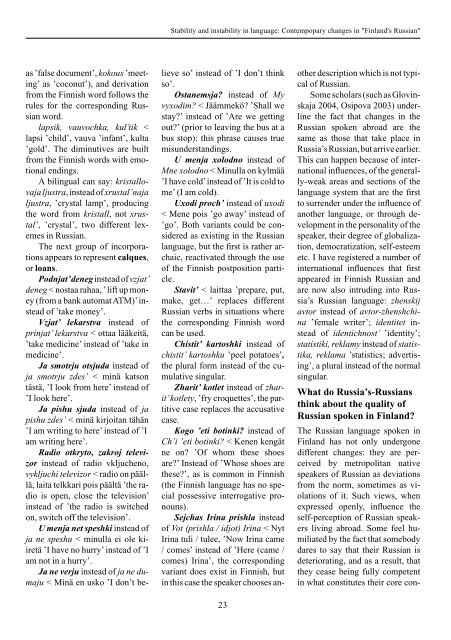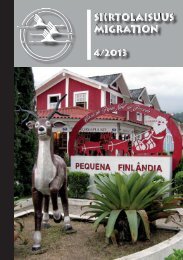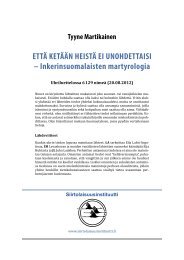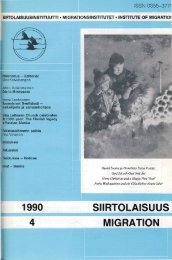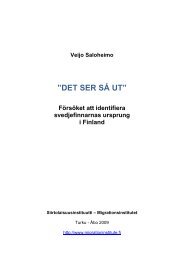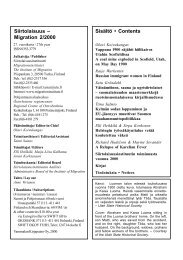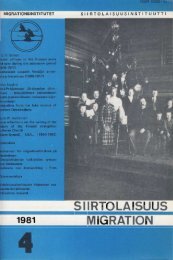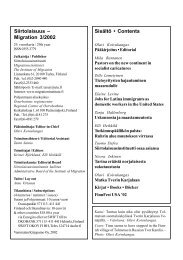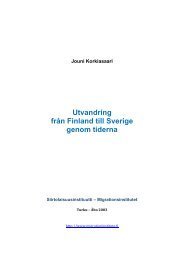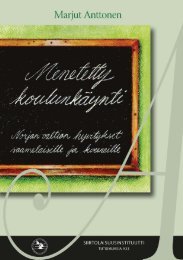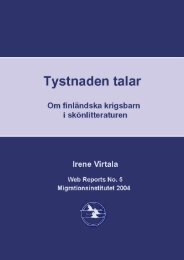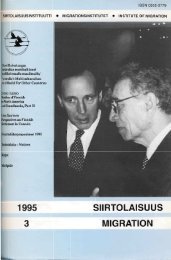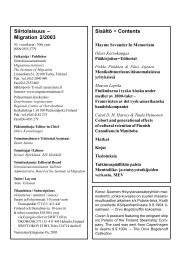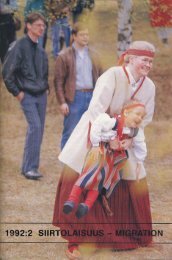2007 - 1 - Siirtolaisuusinstituutti
2007 - 1 - Siirtolaisuusinstituutti
2007 - 1 - Siirtolaisuusinstituutti
Create successful ePaper yourself
Turn your PDF publications into a flip-book with our unique Google optimized e-Paper software.
as ’false document’, kokous ’meeting’<br />
as ’coconut’), and derivation<br />
from the Finnish word follows the<br />
rules for the corresponding Russian<br />
word.<br />
lapsik, vauvochka, kul’tik <<br />
lapsi ’child’, vauva ’infant’, kulta<br />
’gold’. The diminutives are built<br />
from the Finnish words with emotional<br />
endings.<br />
A bilingual can say: kristallovaja<br />
ljustra, instead of xrustal’naja<br />
ljustra, ’crystal lamp’, producing<br />
the word from kristall, not xrustal’,<br />
’crystal’, two different lexemes<br />
in Russian.<br />
The next group of incorporations<br />
appears to represent calques,<br />
or loans.<br />
Podnjat’ deneg instead of vzjat’<br />
deneg < nostaa rahaa, ’ lift up money<br />
(from a bank automat ATM)’ instead<br />
of ’take money’.<br />
Vzjat’ lekarstva instead of<br />
prinjat’ lekarstva < ottaa lääkeitä,<br />
’take medicine’ instead of ’take in<br />
medicine’.<br />
Ja smotrju otsjuda instead of<br />
ja smotrju zdes’ < minä katson<br />
tästä, ’I look from here’ instead of<br />
’I look here’.<br />
Ja pishu sjuda instead of ja<br />
pishu zdes’ < minä kirjoitan tähän<br />
’I am writing to here’ instead of ’I<br />
am writing here’.<br />
Radio otkryto, zakroj televizor<br />
instead of radio vkljucheno,<br />
vykljuchi televizor < radio on päällä,<br />
laita telkkari pois päältä ’the radio<br />
is open, close the television’<br />
instead of ’the radio is switched<br />
on, switch off the television’.<br />
U menja net speshki instead of<br />
ja ne speshu < minulla ei ole kiiretä<br />
’I have no hurry’ instead of ’I<br />
am not in a hurry’.<br />
Ja ne verju instead of ja ne dumaju<br />
< Minä en usko ’I don’t be-<br />
Stability and instability in language: Contempopary changes in "Finland's Russian"<br />
lieve so’ instead of ’I don’t think<br />
so’.<br />
Ostanemsja? instead of My<br />
vyxodim? < Jäämmekö? ’Shall we<br />
stay?’ instead of ’Are we getting<br />
out?’ (prior to leaving the bus at a<br />
bus stop): this phrase causes true<br />
misunderstandings.<br />
U menja xolodno instead of<br />
Mne xolodno < Minulla on kylmää<br />
’I have cold’ instead of ’It is cold to<br />
me’ (I am cold).<br />
Uxodi proch’ instead of uxodi<br />
< Mene pois ’go away’ instead of<br />
’go’. Both variants could be considered<br />
as existing in the Russian<br />
language, but the fi rst is rather archaic,<br />
reactivated through the use<br />
of the Finnish postposition particle.<br />
Stavit’ < laittaa ’prepare, put,<br />
make, get…’ replaces different<br />
Russian verbs in situations where<br />
the corresponding Finnish word<br />
can be used.<br />
Chistit’ kartoshki instead of<br />
chistit’ kartoshku ’peel potatoes’,<br />
the plural form instead of the cumulative<br />
singular.<br />
Zharit’ kotlet instead of zharit’<br />
kotlety, ’fry croquettes’, the partitive<br />
case replaces the accusative<br />
case.<br />
Kogo ’eti botinki? instead of<br />
Ch’i ’eti botinki? < Kenen kengät<br />
ne on? ’Of whom these shoes<br />
are?’ Instead of ’Whose shoes are<br />
these?’, as is common in Finnish<br />
(the Finnish language has no special<br />
possessive interrogative pronouns).<br />
Sejchas Irina prishla instead<br />
of Vot (prishla / idjot) Irina < Nyt<br />
Irina tuli / tulee, ’Now Irina came<br />
/ comes’ instead of ’Here (came /<br />
comes) Irina’, the corresponding<br />
variant does exist in Finnish, but<br />
in this case the speaker chooses an-<br />
23<br />
other description which is not typical<br />
of Russian.<br />
Some scholars (such as Glovinskaja<br />
2004, Osipova 2003) underline<br />
the fact that changes in the<br />
Russian spoken abroad are the<br />
same as those that take place in<br />
Russia’s Russian, but arrive earlier.<br />
This can happen because of international<br />
infl uences, of the generally-weak<br />
areas and sections of the<br />
language system that are the fi rst<br />
to surrender under the infl uence of<br />
another language, or through development<br />
in the personality of the<br />
speaker, their degree of globalization,<br />
democratization, self-esteem<br />
etc. I have registered a number of<br />
international infl uences that fi rst<br />
appeared in Finnish Russian and<br />
are now also intruding into Russia’s<br />
Russian language: zhenskij<br />
avtor instead of avtor-zhenshchina<br />
’female writer’; identitet instead<br />
of identichnost’ ’identity’;<br />
statistiki, reklamy instead of statistika,<br />
reklama ’statistics; advertising’,<br />
a plural instead of the normal<br />
singular.<br />
What do Russia’s-Russians<br />
think about the quality of<br />
Russian spoken in Finland?<br />
The Russian language spoken in<br />
Finland has not only undergone<br />
different changes: they are perceived<br />
by metropolitan native<br />
speakers of Russian as deviations<br />
from the norm, sometimes as violations<br />
of it. Such views, when<br />
expressed openly, infl uence the<br />
self-perception of Russian speakers<br />
living abroad. Some feel humiliated<br />
by the fact that somebody<br />
dares to say that their Russian is<br />
deteriorating, and as a result, that<br />
they cease being fully competent<br />
in what constitutes their core con-


